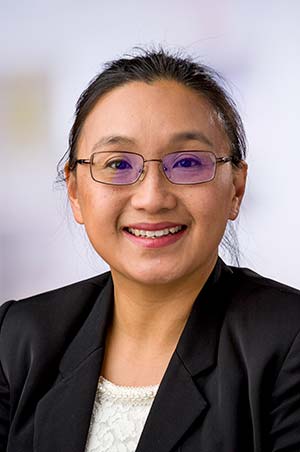Cecilia Yeung, MD
Professor
Translational Science and Therapeutics Division, Fred Hutch
Medical Director
Fred Hutch Clinical Testing Labs
Dr. Cecilia Yeung’s research focuses on genomic changes, clonal evolution, and epigenetic control of gene expression in myeloid neoplasms (MDS, MPN and AML) and she has developed research expertise in biomarker and mutation profiling of cancers with cross correlation of clinical and pathology data (including histology, immunohistochemistry, flow cytometry, cytogenetics and clinical molecular testing). Dr. Yeung’s goal is to help all patients around the world get to appropriate treatments faster to enjoy better outcomes and improve survival. Her vision and personal expertise in molecular pathology has led to the pursuit of novel molecular diagnostic platforms and bioinformatics solutions that push the limits for faster, simpler, more accurate, and more cost-effective diagnostic tools.
Other Appointments & Affiliations
Associate Professor, Department of Laboratory Medicine and Pathology, University of WashingtonAssociate Professor, Department of Laboratory Medicine and Pathology
University of Washington
Pathologist
Fred Hutchinson Cancer Center
Affiliate Faculty, Global Oncology Program
Fred Hutchinson Cancer Center
Education
Teaching Scholars, University of Washington, Seattle, WA
Fellowship, Molecular Genetics Pathology; Washington University, St. Louis, MO 2010-2011
Fellowship, Hematopathology, Washington University, St. Louis, MO 2009-2010
Residency, Anatomic and Clinical Pathology; University of California Davis Medical Center, Davis, CA 2009
MD, Penn State College of Medicine, 2005
BS, Biotechnology-Microbiology, University of California Davis, Davis, CA 1999
Clinical Focus
As a clinical pathologist with subspecialty training in anatomic/clinical pathology, hematopathology, and molecular genetic pathology, Dr. Yeng’s clinical expertise has now evolved around hematopoietic neoplasms, immunotherapy, and transplant pathology. Recently, Dr. Yeung’s work has involved collaborative studies on post immune-modulatory or adoptive cellular therapy potency, tissue cross reactivity, biomarker fidelity, post treatment complications and adverse events.
Research Interests
Yeung Lab focus on advancement of precision oncology by :
1) Study of disease response and resistance in myeloid neoplasms using data on molecular, genetic, and environmental factors to understand factors that may drive clonal events and evolution
2) Developing innovative molecular technologies and bioinformatic tools, which strives to improve health care throughout the world with more effective molecular diagnostics – tests that are rapid, precise, and affordable
3) Study of Transplant and immunotherapy biomarkers and treatment related adverse events in patients.
The Yeung lab employs a gamut of fit for purpose tools to 1) study the interactions in the tumor microenvironment employing spatial profiling techniques such as multiplexed immunohistochemistry with digitally enhanced image analysis tools, interdigitated with prediction-based gene expression, 2) clonal evolution through disease progression and relapse with mutation analyses with ultra-deep sequencing and other high error reduction based systems to allow for tracking and studying the evolution of micro clones, 3) novel molecular platforms that can give us deeper levels and more accurate information each molecule of nucleic acid and each cell.
Clinical Testing Lab
The CLIA Medical Director of the Fred Hutch Cancer Center Clinical testing Labs including Clinical Trials Pathology, Molecular Oncology, and Targeted Proteomics Labs. This has allowed Dr. Yeung to participate in multiple clinical trials both at our institution and through one of the nationwide collaborative clinical trials group, the Southwest Oncology Group (SWOG).
Current Projects
- Clonal evolution in heme neoplasms
- Post-HCT patients who develop subsequent hematopoietic disease from their donor cells
- Measurable residual disease and the clinical implications of variant tracking in patients
- Clonal evolution of disease in AML patients post HSCT
- Clonal evolution and development of resistance in CLL under targeted therapies
- Genomic profiling and risk prediction in MDS and MDS/MPN U
- Novel molecular biomarkers of myeloid neoplasms for use in new targeted therapies
- Tumor and immune environment changes with alterations in gene expression patterns in response to specific targeted and immunotherapies
- Detection of biomarkers to differentiate GVHD, intestinal TMA
- T cell clonality in graft-vs-host disease
- HHV6 detection and its relationship to GVHD
- Resistance, evasion mechanisms, and adverse events of immune therapy
- CAR-T therapy related adverse events
- Resistance and evasion mechanisms of cancers after treatment with adoptive immune therapy
